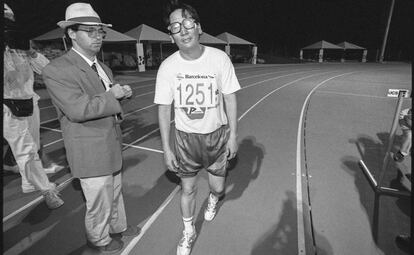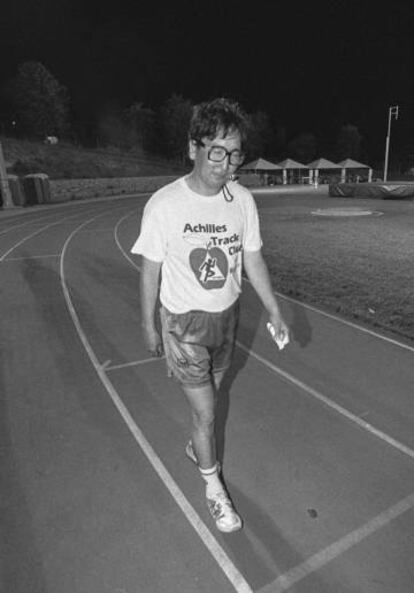The Mongolian marathon man who shone alone at Spain’s 1992 Olympics
Pyambuu Tuul recorded the worst time in 84 years in Barcelona, but it was a triumph over adversity

Unlike Eric Moussambani, the swimmer from Equatorial Guinea who crawled his way to fame in the 2000 Sydney Olympic Games with the slowest time ever for the men’s 100m freestyle, Mongolia’s Pyambuu Tuul never became a household name.

But Tuul’s story is no less remarkable. It may have been the gold, silver and bronze marathon medalists who were invited to Barcelona this month to celebrate the 25th anniversary of the 1992 Olympics, but it is the likes of Pyambuu Tuul who really remind us what the Olympian spirit is all about.
Born in 1959 in Ulan Bator, Tuul was the only Mongolian athlete competing in Barcelona. Signed up for the men’s marathon, he took four hours and 44 seconds to complete the race, crossing the finishing line one hour and 47 minutes after the South Korean Young-Cho Hwang, who earned gold, and 56 minutes after the athlete who came in second to last.
Tuul’s marathon run was a grand gesture of gratitude
By the time Tuul was on the home stretch, the closing ceremony for the Games had begun and, along with four other of the slowest runners, he was shunted onto a warm-up track near the stadium devoid of spectators, all but silent and dimly lit.
Not that Tuul was a stranger to gloom. A plasterer by trade, he had lost his sight in both eyes at the age of 19 in an explosion. Twelve months before the 1992 Games, the Achilles Club financed an operation giving him his sight back in one eye. Unaware of this, one Olympic judge accused him of giving the club free publicity after Tuul, thinking the race was over, removed his bib, exposing the Achilles Club’s name on his running vest.
By the time Tuul was on the home stretch, the closing ceremony for the Games had begun
In the event, free publicity would have been no more than the Achilles Club deserved. Set up in New York in 1983 to encourage disabled athletes to compete in athletic events, its founder Richard Traum came to hear of Tuul, and invited him to New York to run the 1991 New York marathon with the help of a guide. A simple operation meant he recovered his sight in one eye, allowing him to see his wife and two children, ages six and eight, for the first time. It was then that Tuul vowed to run the Olympic marathon.
A year later, in Barcelona accompanied by 20 police officers, a car full of judges, a posse of motorbikes and a sweeper van, Tuul kept his pledge and completed the 42.195km race in the highest-profile event in sport.
After he had crossed the finish line, a journalist approached him and asked him why he had run so slowly. “No,” he said. “I didn’t run slowly. After all, you could call my run a Mongolian Olympic marathon record.”

Another journalist then asked whether it had been the best day of his life, to which he replied: “Up until six months ago I had no sight at all. I was a totally blind person. When I trained it was only with the aid of friends who ran with me. But a group of doctors came to my country last year to do humanitarian medical work. One doctor took a look at my eyes and asked me questions. He said, ‘But I can fix your sight with a simple operation’. So he carried out the operation and after 20 years I could see again. So today wasn’t the greatest day of my life. The best day was when I got my sight back and I saw my wife and two daughters for the first time. And they are beautiful.”
Tuul’s marathon run was a grand gesture of gratitude. And he ended the race proud and happy, despite not actually finishing it inside the Olympic Stadium, and despite the fact the King and Queen of Spain, along with the other spectators, had long since given up waiting for him, and also despite the fact that his glasses had broken that same morning and he had to stick them together with tape. His time was the worst in 84 years, but his personal race had its own merit. “It was a test of man’s possibilities,” says Tuul.
English version by Heather Galloway.
Tu suscripción se está usando en otro dispositivo
¿Quieres añadir otro usuario a tu suscripción?
Si continúas leyendo en este dispositivo, no se podrá leer en el otro.
FlechaTu suscripción se está usando en otro dispositivo y solo puedes acceder a EL PAÍS desde un dispositivo a la vez.
Si quieres compartir tu cuenta, cambia tu suscripción a la modalidad Premium, así podrás añadir otro usuario. Cada uno accederá con su propia cuenta de email, lo que os permitirá personalizar vuestra experiencia en EL PAÍS.
¿Tienes una suscripción de empresa? Accede aquí para contratar más cuentas.
En el caso de no saber quién está usando tu cuenta, te recomendamos cambiar tu contraseña aquí.
Si decides continuar compartiendo tu cuenta, este mensaje se mostrará en tu dispositivo y en el de la otra persona que está usando tu cuenta de forma indefinida, afectando a tu experiencia de lectura. Puedes consultar aquí los términos y condiciones de la suscripción digital.








































